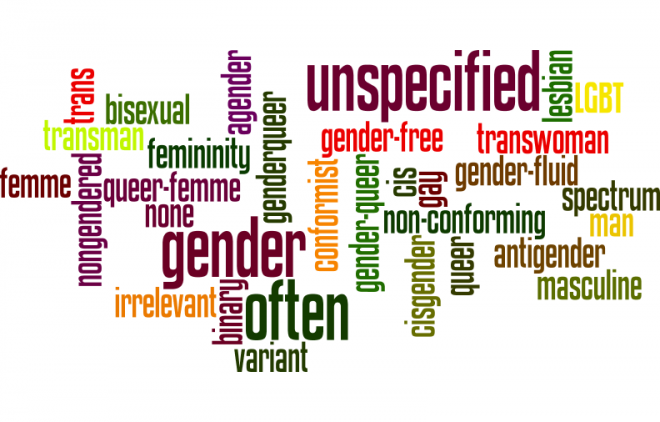CSW panel with Gender at Work
Published on April, 06 2016
By Brandy Robinson, Advancing Human Rights Issue Committee
The 60th United Nations Conference on the Status of Women sponsored a parallel event entitled “Expanding Gender Equality, Unbinding the Gender Binary,” featuring a collaboration of WILPF US, Gender at Work, Say This Not That! and S.H.E. (South Africa).
The panelists were Brandy Robinson, associate professor and 2014 and 2015 WILPF US UN delegate (CSW), Yee Won Chong, strategist and founder of Say This Not That and 2012 TEDxRainer speaker, Shawna Wakefield, associate at Gender at Work and women's rights and gender justice advocate, and Leigh Ann van der Merwe, coordinator and founder, S.H.E., social, health and empowerment feminist collective in Africa and gender rights expert and advocate.

The parallel event March 21 focused on the topic of feminism and the trans justice and rights intersectionality as well as the human rights framework established by Gender at Work as noted in a recent book entitled Gender at Work: Theory and Practice for 21st Century Organizations by Gender at Work’s co-founder Aruna Rao.. This framework helped in illustrating how Gender at Work’s framework could be useful in bridging the divide between feminism and transgender advocacy. Each panelist highlighted unique aspects surrounding this dynamic.

Shawna Wakefield did a wonderful job defining the Gender at Work’s framework quadrants and how the framework has been successfully used in projects and human rights work around the world. She noted that Oxfam, among other organizations, also uses this framework in its advocacy.
Yee Won Chong, representing his brainchild, a tech platform Say This Not That!, provided a rare glimpse of the typical journey of a trans individual who faces daily systemic social discrimination. Chong showed how intersectionality plays a huge part in a trans individual’s life as the individual is severely impacted by discrimination ultimately leading into a cycle of poverty, homelessness, and a poor quality of life. Chong went on to provide positive examples on how communities and organizations could effectuate change for the trans individual and communities as a whole. Some of his examples of Strong Families’ Mamas Day initiative, defusing the negative stereotypes associated with societal traditional view of mothers and even showing how society views families. Another example was the annual Activist Mobilizing for Power (AMP) conference in Portland, OR, where AMP, after years of advocating for gender-neutral bathrooms, was able to influence and change bathroom policy for the betterment and safety of trans individual, which eventually benefited everyone. This resulted in a Gender Neutral toolkit that other organizations could use to create similar gender-neutral bathrooms.
Leigh Ann van der Merwe, representing S.H.E., gave a moving account of the unique issues faced by trans individuals outside the US, particularly in areas such as South Africa. While Leigh Ann acknowledges that South Africa has one of the most progressive constitutions that seemingly protects an individual in the LGBTQ community, she states that these rights are not always enforced and are what you would call “paper” rights and that many trans individuals are fearful in coming out due to the lack of enforcement of the laws, resulting in a lack of empowerment and support for the LGBTQ individual and communities. Leigh Ann stated that this was one of the many reasons why S.H.E. was formed as to empower the LGBTQA community. Leigh Ann shared her own experiences as an interracial trans individual and also noted that the typical journey of a trans individual gets even more unique and discriminatory when race is an issue, as the vestiges of apartheid are not completely erased from South Africa.
Brandy Robinson, representing WILPF US, focused on the governmental application as it relates to the Gender at Work’s framework and in applying it to the trans and feminist advocacy fields. Robinson used the example of the same sex marriage debate, where some do not see the same-sex marriage debate and trans advocacy as one in the same. Robinson stated that they are one in the same and that the feminist community has seen similar issues like this before with women of color and women’s advocacy, as historically African American women were denied their rights to equal protection under the law due to race and further denied their privilege due to gender. Robinson went on to state that if the Gender at Work’s framework is used, the trans and feminist community could see great benefit with advocating for a common cause. She noted that the success of the trans advocacy and feminist advocacy field depends largely on speaking the language of the policymakers as noted in the Gender at Work’s framework, as this was successfully done in the same-sex marriage debate----it was no longer about same-sex marriage but a universal concept that fixed issues and errors under the law that also impacted heterosexual couples who could not take benefit from the traditional benefits of a marriage.
The panelists also participated in other CSW60 parallel events, which were equally successful in the depth of knowledge, information and experience provided to the audiences. These events ranged on topics such as violence against women and girls with a survivor panel providing moving testimony on their experiences and how they have evolved into national advocates against violence toward women and girls, while other parallel events focused on violence against trans individuals and the most effective solutions and the legal consequences associated with violence against trans individuals.
Please note that Gender at Work: Theory and Practice for 21st Century Organizations can be purchased online at Routledge, Barnes and Noble, powells.com, Amazon, Google and other major booksellers. For more information, contact Aruna Rao, co‐founder of Gender at Work, arunashreerao@gmail.com.
To contact the panelists and/or organizations involved, please see the information below.
Organizations
Women’s International League for Peace and Freedom
Individuals



